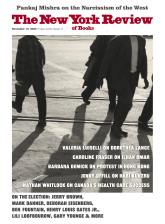As a historian of the early American republic, I’ve been asked a lot recently whether the country has ever seen a period like the one we have experienced since 2016. The question is often posed by people with furrowed brows, their apprehension and concern about our future written on their faces. There’s a sense that some fundamental and very disheartening truths about the United States—its people, its system of government—have been revealed over the past four years, truths that we’ve been trying to ignore for some time. When answering queries about our current predicament, I play the role of the dutiful chronicler of the country’s past, reminding my questioners that the United States has experienced tough times before, times of great turmoil that crippled politics and set Americans at one another’s throats. The bruising political battles of the 1790s that saw the birth of political parties, the years leading up to the Civil War and then the war’s immediate aftermath—these were moments when the American Experiment could have failed completely. But it didn’t.
Such references to past conflicts are meant to reassure, but this isn’t always successful—even for me. For most of my career as a historian I’ve spoken and written about the story of early America in as clear-eyed a manner as possible, eschewing both heroic presentations of the people credited with creating the American republic and the concept of American exceptionalism itself. But at the same time, I confess, there was always a small voice inside me presenting a counternarrative. It is that counternarrative that is imperiled by what has been going on in the country of late, and it is the basis of my sense of alarm.
That internal narrative went something like this: The Declaration of Independence is, and should be, the creed of the American nation. Sure, the system brought into being by our eighteenth-century Constitution protected slavery, failed to vindicate the rights of women, and was antidemocratic. But eventually that Constitution was transformed by a bloody war and postwar amendments, influenced by the spirit of the Declaration, which transformed the original Constitution, pushing it toward “a more perfect union.”
As the decades wore on, with much concerted struggle—always moving through fits and starts, advances and retreats—more progress was made. By the end of the twentieth century, the promise of the Civil War amendments began to be fulfilled, albeit over the determined opposition of Americans who believe the United States is a white man’s country. I did not see the election of Barack Obama as the apotheosis of this process, though it was, without doubt, a major milestone. There is certainly much more ground to cover if we are going to create a society in which Black Americans are truly equal citizens. But things seemed to be moving in the right direction, notwithstanding Chief Justice John Roberts’s abandonment of efforts to protect Black voting rights, which stand at the core of citizenship in a republic.
Historians are, of course, supposed to reject out of hand this type of Whiggish narrative of American history, one driven by faith in the idea of inevitable progress toward a better, more enlightened destination. The American experiment does not have to “work.” Empires and nations rise and fall. But while I am a historian, I am also an American. In thinking about the country, I experience a classic split between my head and my heart. Intellectually, I know there is no reason at all to believe in any particular direction of the American future. As we have seen, and been reminded daily to an absolutely exhausting degree, anything can happen. At the same time, in my heart, I have hoped. I’ve wanted to believe that the country that started with dispossession of native peoples, slavery, and a dedication to white supremacy could live up to the more idealistic aspirations of its founding—the statements about equality and the pursuit of happiness, and the desire to create a representative democracy in which the people were sovereign.
That vision of the future has been challenged of late. But, as in years past, the many people who share this vision have mobilized in support of it. I suppose that is the most that can be hoped for, because that kind of struggle is the only way better futures can be made.



